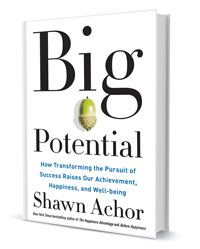Michelle Gielan: Shawn, what led you to write your new book, Big Potential?
Shawn Achor: Since writing The Happiness Advantage, I had a huge discovery. I became a father as you know [Note: Shawn and Michelle are married happiness researchers], and this has changed so much of my thinking about what creates happiness and meaning. For the past 10 years, I have been sharing positive psychology research on happiness around the world, and yet during that time depression rates and suicide rates have doubled among almost every age group—including for 8-year-olds! We seem to be going in the wrong direction. What is going on that has caused such a dramatic shift, and how do we stop it so our son doesn’t have to live in that world?
I believe that there is one main reason why we are seeing elevated rates of anxiety in our schools and unhappiness in the world—a crucial mistake that every major religious tradition and ancient philosopher warned us against. We have been trying to pursue happiness and success by ourselves, in isolation and in competition. We have been told that success is a zero-sum game, and if someone else gets happier you will feel worse in comparison. We’ve also been told that happiness is a private, personal choice, and that you can’t change other people. This leads us to feel disconnected at work, hypercompare on social media and never feel like we are enough.
This is what I call “small potential”—believing we have to do all this alone. We have been taught to strip others out of our formula for success and happiness. When you choose to be more grateful and positive, that makes other people around you more grateful and positive as well. This creates a virtuous cycle. I felt like something needed to be done to help people realize that scientifically, the only way to achieve our “big potential” is to transform the pursuit of happiness and success from a solitary one to an interconnected one.
Michelle: What is one of the most eye-opening studies from the new book?
Shawn: I have lots of new research in the book, but my favorite is not mine. It comes from researchers from the University of Virginia, who originally found that if you look at a hill you need to climb, and you are in a negative state of mind, that hill can look 30 percent steeper than it actually is (cited in Before Happiness). But in the follow-up study, they found something even more amazing: If you judge a hill you need to climb while standing by yourself, your brain perceives that hill as being 20 percent steeper than if you were standing next to a friend who is not even looking in the direction of the hill. Our very perception of reality is transformed by the presence of others.
Michelle: Does Big Potential include practical, hands-on advice like your previous books?
Shawn: I believe research is useless unless it is lived. Based on more than 40 research studies, we now know that there is a clear path to achieving more success in life while finding more meaning and happiness. Once you’ve made the mindset change that you must pursue happiness and success with others, the book outlines five steps—“SEEDS”—that lead to big potential. They are:
– Surround yourself with positive outliers. This allows you to create a star system instead of trying to be a superstar alone.
– Extend power to others. This allows you to take the burden of change off your shoulders and let others shine while you focus on your strengths.
– Enhance others using prism praise. Instead of trying to raise others up using comparison praise (you’re so much smarter than the other kids), focus on praise that builds up the individual and the supporters that got them there.
– Defend the gains. In a hyperconnected world, we need to build up our emotional immune system so that we are not overwhelmed by people seeking small potential.
– Sustain the momentum. This chapter is filled with practical ways in which you can help create collective momentum so that it is easier to maintain growth.
Michelle: What is your favorite story from the new book?
Shawn: It’s actually two stories together, both about flashing. I start the book with a biologist who discovered millions of lightning bugs all lighting up at the exact same time in Indonesia. Biologists and mathematicians didn’t believe him because how could they possibly do it without a leader, and why would they shine together? But it turns out when a lightning bug
ashes alone, they have a 3 percent chance of finding a mate that night. When they flash together, the success rate is 82 percent. It seems we shine brighter together.
I pair that with a story at Harvard where as a tradition the students take off their clothes and run through Harvard Yard naked at midnight before exams, flashing all the onlookers. I attempted the run in the buff, but was too shy to go with the group. As soon as I walked out of my room into the snow, naked and barefoot, I realized that letting the group go two minutes ahead of me was a mistake. It meant that everyone would see me alone; in a group, you can’t tell anyone apart on a snowy night. I immediately regretted it, but when I turned to go back inside I realized I had locked myself out of my dorm. To me, that is a perfect metaphor for trying to pursue success alone and in isolation. We are less successful and much more exposed. We are better together.
SHAWN ACHOR and MICHELLE GIELAN bring positive psychology to organizations all over the world to fuel happiness and success. Shawn is The New York Times best-selling author of The Happiness Advantage and Before Happiness. His TED Talk has over 5 million views and millions have seen his PBS program. Michelle is the founder of the Institute for Applied Positive Research and formerly served as a national news anchor for CBS News. She holds a master’s degree in applied positive psychology from the University of Pennsylvania and recently published the book Broadcasting Happiness.
Visit them at shawnachor.com and michellegielan.com.
(Visited 327 times, 1 visits today)







